To continue with last weeks journal...
We arrived at the Posado shelter with our very sick kitten. We prepared a fluid bag and an IV catheter. I find it fairly difficult to place an IV in a patient that small (6-7 wks old), never mind an anemic, shocky kitty. But the catheter angels guided my fingers, as I placed it with no problems. We hooked her up to the fluid bag, and said a prayer, not hoping too much. She was treated for fleas and place in a kennel in the hospital area.
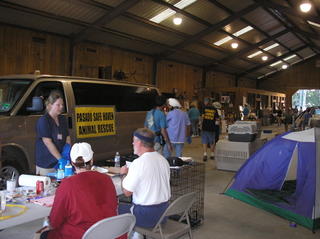
The team that had been there all day had been working hard at intake. These vets and techs were dealing with frightened, sometimes aggressive, and very dirty animals, and were so great with all of it. Team Canada was rocking that barn! As pets came in, they were examined, scanned for a microchip, given one if none was found, dewormed, given flea medication, had their picture taken, assigned a number, and given a kennel. Strict records were kept in order to maximize the chances at reuniting them with their owners.
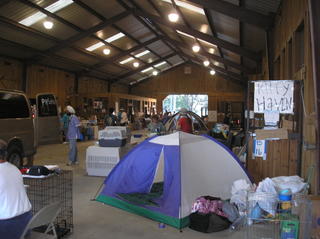
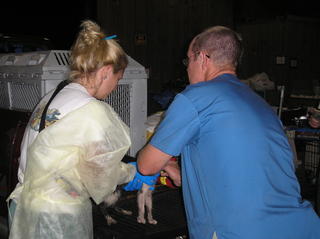
I helped with intake for a few hours. I lost track of how many animals were brought in. It was just a non stop barrage of flea meds, dewormer and paperwork. I remember thinking how grateful I was for Dr. H. making us learn how to estimate patient weights, as there was no scale around!
There was an dog isolation 'ward' set up in the back of the shelter behind the barn. There were a lot of pets with suspected ringworm, as well as the bloody diarrhea that you can expect in those conditions and with that many dogs in one place. It certainly was not ideal as far as isolation goes, but it was what we were able to do. Care was taken to walk those dogs in a different area from the general population, and their kennels and dishes were washed separately.
There were a fair number of dogs and cats that needed medical care beyond just the initial intake. Mostly just meds and treatments, but with that many pets, getting them all done with the few vets and techs there was a challenge. There were the occasional minor surgeries as well, minor lacerations needing to be sutured up. One was a little pup who had been attacked by one of the pitties. They were both being walked at the same time, and the pittie just jumped the little guy's leg and wouldn't let go. When they were finally separated, the little guy had a fairly deep gash that needed suturing. They popped that brave little soul up on the table, a little local anesthetic and a drain tube later, and he was sutured up. I don't think he had time to even react it all happened so quickly!
I think we left that night about 9:30, dirty and tired. We stopped at a McDonalds on the way home, and I'm sure they will be grateful never to see us again. A group of 13 smelly Canadians is likely not great for business...We all got to our cots and just fell into bed, only to be up early the next morning and back at the Shelter again.
Wednesday we were back at the shelter. I checked on our little kitten first thing. She was standing! Very wobbly, but at least she wasn't just flat out. She had the slightest hint of a pink tinge to her gums too. I was pretty happy about that.
We had also admitted another cat the night before who was 10-12% dehydrated. That is severe dehydration for a cat, and they won't survive long without treatment. She hadn't wanted to eat the night before either. Our vets hadn't arrived yet, so we had one of the Posado vets check her. He felt her dehydration had much improved and recommended we give some subcutaneous (under the skin), and encourage her to eat. She was still so dirty also. I pulled her catheter, gave her the subcutaneous fluids, and went in search of something tasty for her. I found some seafood moist food, and put some in with her. She didn't wolf it down exactly, but she did eat a fair bit. We were very encouraged. I gave her a bath as best I could with a bucket of water and a sponge, and borrowed one of the groomers brushes and brushed her out. She looked (and I'm sure felt) much better.
I feel like I may have written about this dog already, so forgive me if I am repeating myself. About midmorning, Tara Lee came back to the dog area from the barn where she was doing intake, and told me I had to come see this dog. I went up to the barn with her, and was completely speechless at what I saw. This pitiful creature lying there, skin and bones and not much else. I knelt down beside him, and gave him my hand to sniff. He looked so weak, he could hardly lift his head, but his tongue flicked out to lick me, and his little stubby tail wagged. I asked Tara Lee "How is he still alive?". She looked at me, smiled, and said "He's a miracle". His name was Tiger, and he had been shut up in his house or garage since the storm. His owner had called and asked for someone to go check on him. I had to go and grab my camera and get a picture. I had tears rolling down my face as he ate a small bit of food (too much at once would just make him vomit), and then he got up on wobbly legs and went out for a pee. A miracle.
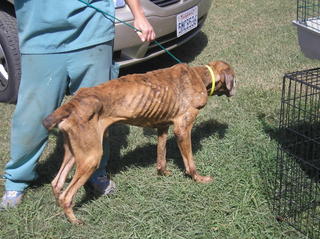
We were just getting finished up with all the morning treatments and vet checks and were about to break for lunch when the organizers called a meeting. The Posado group, who were running the shelter, felt as though they had reached their limit of animals they could take. They were on a private farm, and there was only so much room. They were asking the HSUS volunteers (which we were) to finish up with what we were doing, and then we would be done at that shelter. The volunteers were all sort of shocked, especially us. They only had 1 vet there, the rest of their veterinary team was out in the field. There was no way they could handle all the treatments. We offered our services, at least for the rest of the day, and it was accepted. We were sure there were some more bureaucrat reasons for the dismissal, but we were only concerned that the pets be taken care of. The rest of the team stayed, while I was asked to go with another volunteer to check out a new shelter in the Slidell area (different from the one we already had people at).
I was going with Jean, a lady from Manitoba originally, who now lived in Kentucky. We got directions from the woman who owned the shelter and we were off. She told us we were about an hour and a half away. We missed the turnoff she told us to take, but saw from the highway signs that we could get to Slidell the way we were going. We ended up in a traffic jam of cars that moved about 2 miles in 1 & 1/2 hours. One of the bridges had been damaged in the hurricane, and was missing a section, so 3 lanes were having to merge into one. On top of that, the other route to Slidell was closed due to an overturned tanker truck. Never had the experience of that kind of jam before. Hope to never have it again...

We finally arrived at the shelter about 3 hours after we started. It was a converted house, and was used as a boarding facility as well as a groomers. The woman running it was obviously an animal lover, as she also did wildlife rescue and had a fawn in residence. She had 40 dog runs, all full with boarders and rescues to be shipped to other shelters soon, and several cats. The facility would likely have been fine for a shelter of rescued pets, but the logistics of getting there would be difficult. We spoke with several people in the traffic jam that said that afternoon traffic was always like that with the other bridge out. Having rescued pets in vehicles for that long would only add to their stress I'm afraid. The shelter was ruled out as an option.
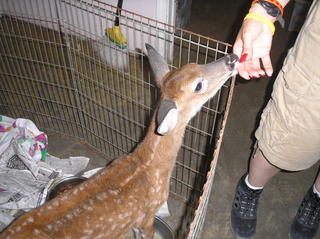
Jean and I headed back to Lamar-Dixon. The main highway was still closed due to the tanker, so we went a little out of our way through Baton Rouge back to Gonzales. I have always wanted to go to Baton Rouge, even if it was just passing through. We arrived back at the Expo Grounds just in time for a 10:00 meeting. A triage center was to be set up in New Orleans the next day (Thursday), and rescued pets that could make a 2 hour trip would be shipped to Mississippi in an air conditioned tractor trailer. Those that were too critical to make the trip would be sent to an Emergency hospital that was open in New Orleans.
Next up: Triage in a grocery store parking lot.

No comments:
Post a Comment